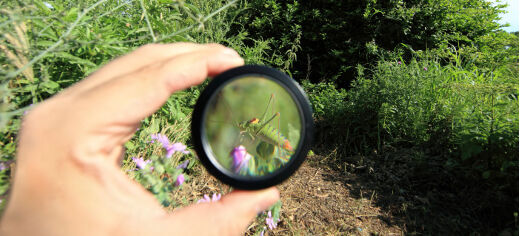
University of Leeds researchers are playing a key role in a €7 million international collaboration, granted by the European Union's Horizon 2020 fund, to develop new, eco-friendly pesticides.
In place of the old approach of trying to annihilate insect populations with toxic chemicals—which often has unwanted environmental and health effects—the scientists will be intervening much more precisely in insects’ physiologies or even psychologies.
The project will focus on neuropeptides – small protein-like molecules that help insects’ brains and tissues communicate with each other. By developing artificial molecules to mimic these molecules they plan to turn the pest insects’ own hormones against them by altering their behaviour or physiology.
The scientists will be exploring different ways of influencing these systems in order to impair the insects’ ability to inflict damage, including:
• reducing insects’ fitness by interfering with fat mobilisation, which is important for locusts’ swarming behaviour,
• changing the neuropeptides that control the pheromones moths release to attract mates and tell each other where sources of food are located,
• Altering neuropeptides that affect the balance of fluid, ions and water in pests. Insects have a simple kidney system functionally similar to humans. Preventing them from losing water when they need to, or forcing them lose it when they shouldn’t, will make them sick.
The economic cost of pests is extremely difficult to estimate but biological threats such as insects and disease account for around 40% of all crop losses globally. By 2017, the world is expected to spend more than $65 billion annually on pesticides.
The project is led by the University of Glasgow and involves Leeds, The Scottish Government, Forest Research, The Pirbright Institute, Oxitec Ltd, Knowledge Transfer Network Ltd, Katholieke Universiteit Leuven, Universitat Gent, The Agricultural Research Organisation of Israel, Stockholms Universitiet, Universitaet Zu Koeln, the University of Cape Town, and Bruker Daltonik GmbH.
Professor Isaac is an authority on insect peptides and has previously worked with the US Department of Agriculture to rationally design peptides that are active in insects. He will help identify appropriate targets to disrupt development and reproduction in pest species and help design and develop of metabolically stable peptide analogues that can survive degradation in the environment and in the body of the insect pest.
He said: “The ultimate objective of the project is to promote food safety and sustainable agriculture. Neuropeptide-based insect control agents will be much more precisely targeted than traditional insecticides and should be greener.”
The project, funded through Horizon 2020 – the EU’s research and innovation fund – will get underway in June and run for four years.
Professor Shireen Davies, of the Institute of Molecular, Cell & Systems Biology at the University of Glasgow, who is coordinating the project, said: “Insects are the most diverse class of life on earth, and different insects can be essential for, or highly damaging to, agriculture, horticulture and forestry. There is a pressing need, not just for new insecticides to combat resistance in pests, but for more specific, ‘greener’ insecticides that target damaging insects while sparing beneficial ones.”
The pests being targeted in this study include: moths, locusts, aphids, flies and beetles, which either damage crops directly through eating, or by spreading plant viruses.
Professor Isaac is available for interview. Contact Chris Bunting, Senior Press Officer, University of Leeds, phone: 0113 343 2049 or email c.j.bunting@leeds.ac.uk.
Bugs being targeted:
Moths – Heliothis peltigera, Spodoptera littoralis which represent a large variety of Heliothinae and Spodoptera moth species and are world-wide native agricultural pests, Plutella xylostella, diamondback moth, the most important world-wide pest of Brassicas.
Locusts – Locusta migratoria and Schistocerca gregaria, alien swarming agricultural pest of the Southern Mediterranean, Middle East, Asia and Africa, including Southern Africa, and constantly monitored by the FAO.
Aphids – Acyrthosiphon pisum, world-wide native agriculture pest and a model with sequenced genome for horticulture pests including Macrosiphon rosae, which is detrimental to roses, apples and pears in the vital South African fruit industry and the same species as the green rose aphid in Europe; and Myzus persicae, a world-wide agricultural and horticultural pest which favors ready transport on plant material.
Flies – Drosophila suzukii, an alien horticulture pest in Europe and USA. Spread of D. suzukii is currently uncontrolled by EU regulatory authorities thus novel biocontrol is urgently needed. Ceratitis capitata, the Mediterranean fruit fly (medfly), is also capable of causing extensive damage to a wide range of fruit crops across the Mediterranean.
Beetles – some species are also pests and include the flour beetle, Tribolium castaneum (pest of stored grain) and pine weevil (Hylobius abieti), a long-term native pest of spruce and pine, severely affecting forestry production and causing significant financial losses in the EU.